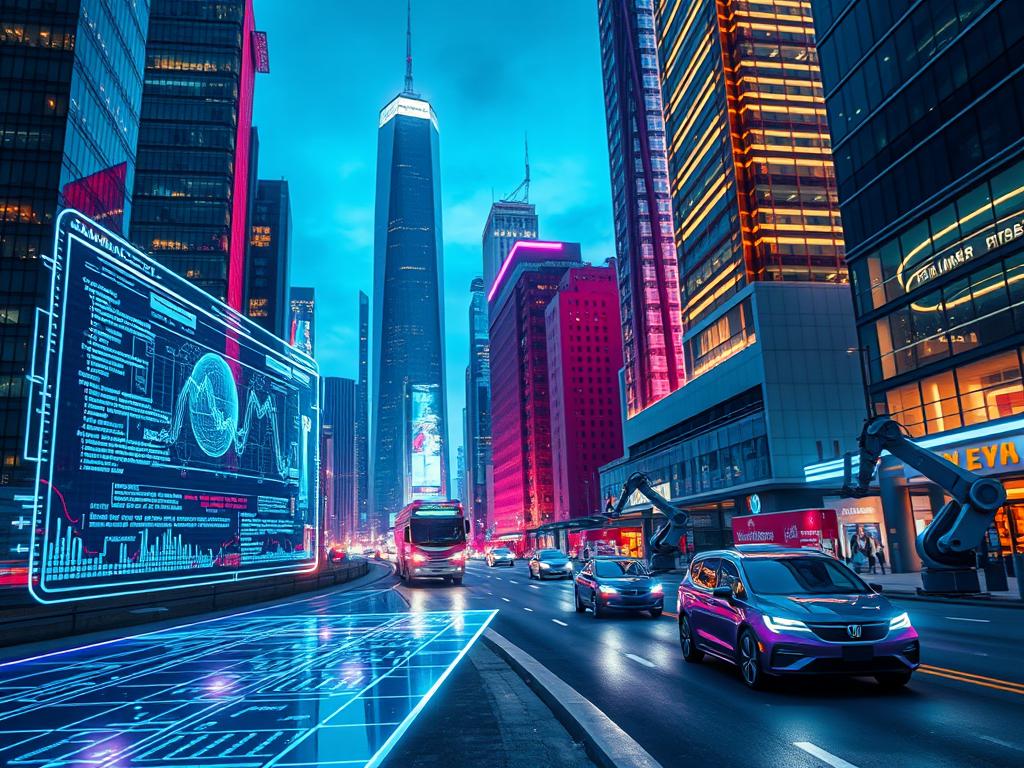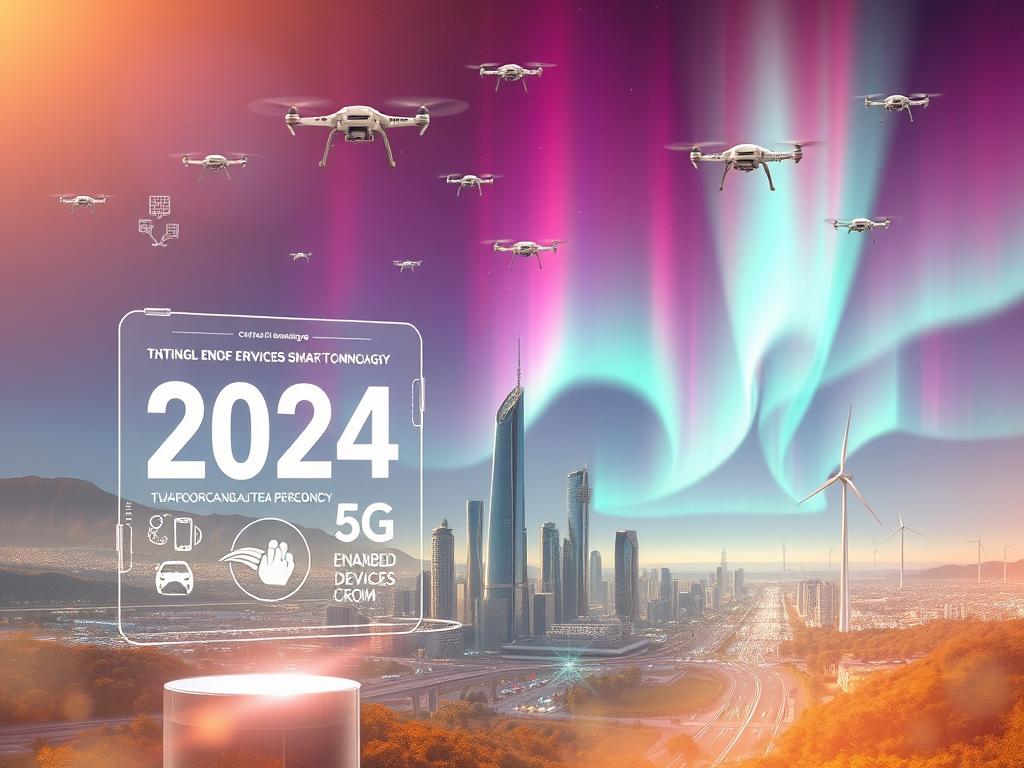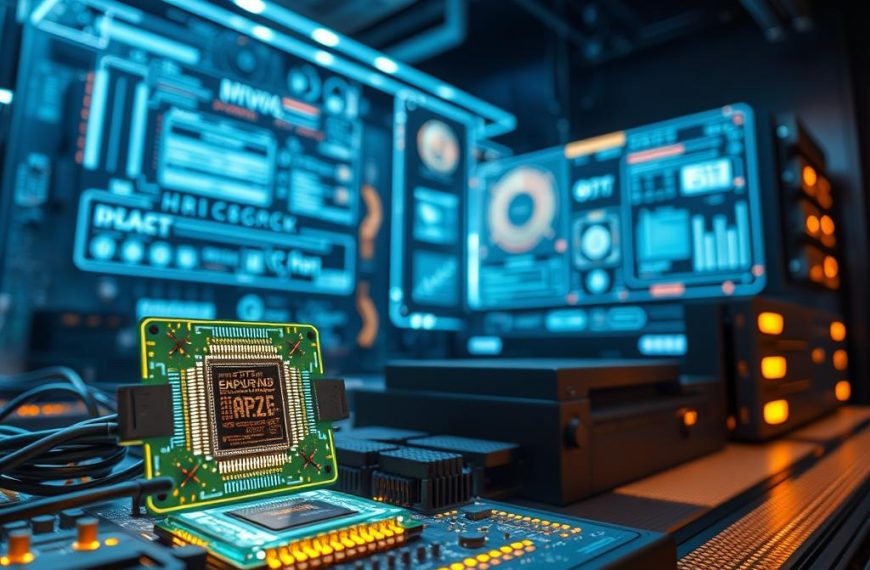In 2024, emerging technologies are reshaping industries and pushing innovation boundaries. Global IT spending is set to reach £5 trillion. This investment signals a bright future for tech that will change our lives.
Technological innovations are speeding up, with generative AI leading across sectors. The National Science and Technology Council’s list highlights these advancements’ critical role. They drive national security and global competitiveness.
Quantum computing and AI are unlocking new possibilities in 2024. Robotic Process Automation is streamlining finance and customer service. Digital twin technology enables precise decision-making through real-time data analysis.
5G, edge computing, and the Internet of Things are creating a smarter world. AI and machine learning continue to redefine industries. They offer unmatched opportunities for efficiency and innovation.
We’re on the brink of a tech revolution. These emerging technologies promise to solve complex challenges. They’ll drive economic growth and create new paradigms of human potential.
Understanding the Evolution of Critical Technologies in 2024
In 2024, critical technologies are reshaping national security and global innovation. These advancements are challenging traditional research and development boundaries. Organisations are witnessing unprecedented technological progress.
Emerging trends in critical technologies show remarkable potential for economic and strategic growth. Recent data offers fascinating insights into this evolution.
- Less than 1% of organisational applications currently incorporate agentic AI
- Projections suggest this will rise to 33% by 2028
- The global AI software market is expected to grow approximately 54% year-on-year
National Security’s Technological Frontier
Technological innovation is now crucial to national security strategies. Governments know that maintaining an edge requires investment in cutting-edge research. Advanced technologies need more sophisticated computational power.
A survey found that 72% of respondents lack sufficient data centre capabilities. This highlights the growing demands of modern tech infrastructure.
Global Innovation and Competitive Dynamics
The race for technological supremacy is heating up. Global innovation now focuses on strategic implementation, not just invention. Breakthroughs are creating new paradigms of international collaboration and competition.
This is especially true in sectors like AI, quantum computing, and cybersecurity. These fields are at the forefront of technological advancement.
Key Technological Advancement Areas
The most promising technological domains in 2024 include:
- Artificial Intelligence and Machine Learning
- Quantum Computing
- Cybersecurity and Data Protection
- Internet of Things (IoT)
- Advanced Networking Technologies
The future belongs to nations and organisations that can effectively harness and integrate emerging technologies into their strategic frameworks.
Artificial Intelligence and Machine Learning: Revolutionising Industries
AI and machine learning are transforming the digital landscape. These technologies are reshaping industries and solving complex challenges. They’re creating new opportunities and pushing innovation to new heights.

Generative AI is leading the charge in technological advancement. It allows machines to create content and solve problems in ways never seen before. This technology is breaking new ground across multiple fields.
Generative AI and Its Transformative Potential
Generative AI is changing how we approach creativity and problem-solving. Its key applications are far-reaching and diverse.
- Content creation in marketing and design
- Complex problem-solving in scientific research
- Personalised customer experience generation
- Advanced predictive modelling
AI in Healthcare and Drug Discovery
Machine learning is making waves in healthcare. It’s speeding up drug discovery and personalising treatment approaches. AI algorithms are now powerful tools for researchers.
- Analyse complex medical data rapidly
- Predict potential drug interactions
- Develop targeted treatment strategies
- Identify genetic markers for diseases
Ethical Considerations and Responsible AI Development
As AI grows more advanced, ethics remain crucial. Responsible AI development is a must for the future.
- Transparent decision-making processes
- Robust privacy protection mechanisms
- Mitigation of potential algorithmic biases
- Collaborative governance frameworks
The future of AI lies not just in technological capability, but in our commitment to developing these technologies responsibly and ethically.
Quantum Computing: Unlocking Unprecedented Computational Power
Quantum computing is revolutionising the computational landscape. It’s pushing beyond traditional computing limits, promising breakthroughs that could reshape industries. Researchers and tech giants are racing to unlock its immense potential.
We’re on the brink of a computational revolution. This emerging technology could transform how we tackle complex challenges across various sectors.
Quantum computing marks a shift in solving complex computational problems. Recent milestones showcase its extraordinary potential:
- Quantum systems have now surpassed the 5000 qubit barrier, marking a significant technological achievement
- Google achieved quantum supremacy in 2019, proving quantum processors can solve problems classical computers cannot
- Nvidia launched its Quantum Cloud platform, democratizing access to quantum simulations
Advancements in Quantum Hardware and Software
Top institutions like MIT, Caltech, and ETH Zurich are developing groundbreaking quantum hardware. Quantum computing has moved from theory to a tangible technological reality.
Advanced quantum error correction techniques have been vital. They’ve helped stabilise quantum systems, making them more reliable.
Potential Applications Across Industries
Quantum technologies could transform various sectors:
- Financial services: Optimising portfolio management
- Logistics: Streamlining operational efficiency
- Healthcare: Accelerating drug discovery processes
- Cybersecurity: Developing unbreakable encryption methods
Challenges and Future Prospects
Despite progress, quantum computing faces hurdles. Quantum states are fragile, requiring ongoing innovation in error correction and stability.
Researchers are developing hybrid quantum-classical systems. These aim to overcome current computational limitations and expand possibilities.
The future of quantum computing lies in our ability to transform theoretical potential into practical, scalable solutions.
Biotechnology and Synthetic Biology: Engineering Life for a Better Future

Biotechnology is revolutionising our grasp of life itself. Scientists are now engineering biological systems with unmatched precision through synthetic biology and gene editing advancements.
Biotechnology’s impact reaches beyond research. It contributes about 5% to the US GDP and is transforming multiple industries.
Gene Editing and CRISPR Technologies
Gene editing has become a powerful scientific tool. Human genome sequencing costs have plummeted from $10,000 to $600 over ten years.
This drop has made genetic research more accessible. CRISPR technology allows precise DNA modifications.
- Precise DNA modifications using CRISPR technology
- Potential treatments for genetic disorders
- Enhanced agricultural crop resilience
Synthetic Biology and Biomanufacturing
Synthetic biology is a breakthrough in engineering living systems. The market could grow from $10 billion in 2021 to $100 billion by 2030.
Current applications include:
- Sustainable fabric engineering
- Cell-cultured meat production
- Plant-based meat alternatives
- mRNA vaccine development
Environmental and Ethical Implications
Despite its promise, researchers must carefully navigate potential risks. Synthetic biology could aid conservation efforts, like engineering resilient endangered plant species.
The future of biotechnology lies in responsible innovation, balancing scientific potential with ethical considerations.
Sustainable Energy Technologies: Powering a Greener Future
Renewable technologies are changing how we generate, store, and use electricity. They offer innovative solutions to our energy challenges. This shift is crucial for tackling climate change and reducing environmental harm.
The sustainable energy landscape is evolving rapidly. Breakthrough innovations are emerging across multiple domains. These developments are transforming our approach to energy efficiency and renewable power generation.
Advancements in Renewable Energy Sources
Renewable energy technologies are becoming more efficient and accessible. Here are some remarkable developments:
- Solar-powered homes can generate more electricity than they consume
- Geothermal systems typically pay off within 5 to 10 years
- Small wind turbines reduce reliance on electrical grids
Energy Storage and Smart Grid Systems
Energy storage technologies are vital for sustainable energy infrastructure. Smart grid systems optimise electricity generation and consumption. This results in reduced carbon emissions.
| Technology | Energy Efficiency Impact | Cost Savings Potential |
|---|---|---|
| Smart Grids | Optimize electricity delivery | Up to 20% reduction in energy costs |
| Geothermal Heat Pumps | Reduce grid dependency | Long-term savings of 30-60% |
| Solar Energy Systems | Generate excess electricity | Potential grid payback |
The Role of AI in Optimising Energy Efficiency
Artificial intelligence is transforming sustainable energy management. AI algorithms can predict energy consumption patterns, optimise grid performance, and enhance overall energy efficiency.
The future of sustainable energy looks promising. Continuous technological innovations are driving us towards a cleaner, more efficient world.
By embracing renewable technologies, we can create meaningful environmental and economic benefits. Prioritising energy efficiency is key to achieving a sustainable future.
Advanced Manufacturing and Industry 4.0: The New Industrial Revolution
Manufacturing is changing rapidly, driven by digital technologies and industrial innovation. Advanced manufacturing is reshaping how businesses create and distribute goods. This new era brings exciting industrial capabilities to the forefront.
Industry 4.0 marks a giant leap in industrial automation. Intelligent systems and connected technologies are transforming traditional manufacturing processes. Companies are tapping into this digital revolution to boost efficiency and productivity.
3D Printing and Additive Manufacturing
Additive manufacturing is a game-changer in advanced manufacturing. It offers several key advantages:
- Rapid prototyping and product development
- Reduced material waste
- Complex geometric design capabilities
- Cost-effective small-batch production
Internet of Things (IoT) in Industrial Applications
IoT technologies are revolutionising industrial automation. They enable smart manufacturing environments that can:
- Collect real-time performance data
- Predict maintenance requirements
- Optimize production workflows
- Enhance operational efficiency
Robotics and Automation in Manufacturing
Robotic systems are becoming more advanced, improving manufacturing processes. Here’s how different technologies impact productivity:
| Technology | Productivity Impact |
|---|---|
| Collaborative Robots | 33% increase in labour productivity |
| AI-Powered Automation | 82% reduction in lead times |
| Smart Factory Systems | 26% reduction in energy consumption |
The future of manufacturing goes beyond technology. It’s about creating smart, adaptable, and sustainable production systems.
Conclusion: Embracing the Future of Technology
Technological convergence is reshaping our world at breakneck speed. We’re on the brink of a remarkable technological revolution. AI, quantum computing, and biotechnology are redefining human potential.
The future isn’t just about inventions. It’s about creating intelligent systems that boost human abilities. Smart cities and augmented reality are making environments that respond to our needs.
Neuro-enhanced interfaces and autonomous vehicles will change our daily lives. These innovations promise to alter how we experience the world around us.
Ethical innovation is vital in this new landscape. We must prioritise responsible development that serves humanity’s interests. The challenge is balancing tech progress with human values.
We need to ensure our advancements support social well-being and tackle global issues. This requires a thoughtful approach to technological development.
Our tech-driven future demands continuous learning and adaptability. We must understand the profound implications of emerging technologies. By embracing innovation wisely, we can create a more connected world.
FAQ
What are the most significant emerging technologies in 2024?
Key technologies include AI, Quantum Computing, Biotechnology, Sustainable Energy, and Advanced Manufacturing. These fields are pushing innovation boundaries. They offer unique chances to tackle global issues and transform industries.
How is Artificial Intelligence changing industries?
AI is reshaping sectors through generative technologies and scientific breakthroughs. It’s improving medical diagnostics and business processes. AI drives efficiency and innovation across various fields.
What makes quantum computing so revolutionary?
Quantum computing marks a major shift in computational power. It can solve complex problems beyond traditional computers’ reach. Its applications span drug discovery, finance, cryptography, and scientific research.
How are biotechnologies contributing to global challenges?
Biotechnologies like gene editing tackle critical global issues. They develop sustainable materials and improve farming techniques. These innovations offer solutions for healthcare and environmental conservation.
What role does national security play in technological development?
National security drives tech innovation and investment. It fosters global competition and collaboration. Governments focus on emerging tech to maintain leadership and address geopolitical challenges.
Are there ethical concerns with these emerging technologies?
Ethical considerations are vital, especially for AI and biotechnology. Discussions centre on responsible development, privacy, and potential misuse. Ensuring these technologies benefit humanity while maintaining safeguards is crucial.
How are sustainable energy technologies addressing climate change?
Sustainable energy tech develops super-efficient solar cells and advanced nuclear fusion. It also creates innovative energy storage solutions. These aim to make clean energy more reliable and accessible.
What is the impact of advanced manufacturing on industries?
Advanced manufacturing tech like 3D printing and IoT systems transform production. They enable greater customisation and improve productivity. These technologies create more flexible and efficient manufacturing ecosystems.
How can individuals prepare for this technological revolution?
Continuous learning and staying informed about tech trends are crucial. Developing digital skills and maintaining an adaptable mindset is important. Understanding the ethical implications of emerging technologies is key.
What makes 2024 a pivotal year for technological innovation?
2024 marks a critical point where multiple tech domains converge. This creates unprecedented opportunities for breakthrough innovations. The intersection of various technologies opens new frontiers of possibility.















